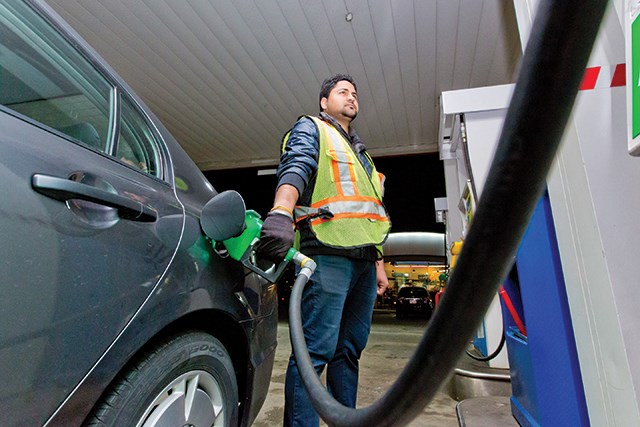Depending on how Coquitlam reacts in the coming weeks and months, Richmond could be the last one of its kind standing in B.C.
We are, of course, talking about the two cities being the only two municipalities in the province that don’t allow self-service gas stations.
City staff in Coquitlam are currently considering a proposal from Chevron Canada to relax the ban, which requires all gas stations to employ dedicated pump attendants.
The results of that examination could go before the city’s council as early as this month.
Such a change in Richmond, which has had a bylaw in place preventing such self-service since 1966 – and was last reviewed in 2003 – seems highly unlikely at the moment.
However, should Coquitlam decide to fall into line with the rest of the province, Richmond mayor Malcolm Brodie admits the spotlight may shift west to his city.
“I wouldn’t be surprised (if there’s more pressure on Richmond), but there would obviously have to be further discussion,” Brodie told the Richmond News.
“Every policy we have, however, is subject to discussion and potential changes. But I certainly don’t feel any public pressure right now to make any changes. I guess the conversation has to start somewhere.”
Asked if he feels uncomfortable about Richmond potentially being the only city in B.C. to have mandatory full-service gas stations, Brodie added, “Not at all. Around the time that we last looked at this in 2003, we talked to people in the industry and we didn’t get any sense that they were looking for any change either and we’ve certainly not heard anything since.
“I really don’t see anything to gain by it, other than the fact that some people like to pump their own gas. But I don’t see that being a big disadvantage.
“I think we have an adequate supply of gas in the city and we are getting better value than most places by being full-serve.”
Although the 52-year-old bylaw doesn’t appear to restrict people pumping their own gas in Richmond – which frequently happens when the attendant is busy or not around – Brodie says it’s like not something the city’s bylaw officers focus on too frequently.
City of Richmond spokesperson Ted Townsend said he isn’t aware of any recent approach from Chevron or other similar companies, but acknowledged that some gas companies have raised the issue in the past.
The bylaw has been reviewed at various times over the years, added Townsend, including the last time in 2003, when there was lobbying from the industry to change the regulation.
City staff supported the amendment but council denied changing the law, which was initially created in 1966 out of concerns for safety.
In the late 1980s, it was believed the stations promoted youth employment. Such sentiments were echoed in 2003.
At the time, said Townsend, they argued it was “actually a deterrent to development of new and improved gas stations in Richmond with additional amenities such as convenience stores.”
The state of Oregon has been the subject of significant online ridicule since it moved earlier this month to lift a ban on self-serve gas stations.
Oregon passed the bill, which took effect Jan. 1, in counties with populations of 40,000 or less — much to the chagrin of some locals, with those who vehemently oppose the change saying they don’t know how to pump gas, fear for their safety when doing so, or aren’t keen on smelling like fuel.
In 2014, the News reported how Richmond had 19 gas stations, ranking ninth among Metro Vancouver municipalities, despite having the fourth largest population.



